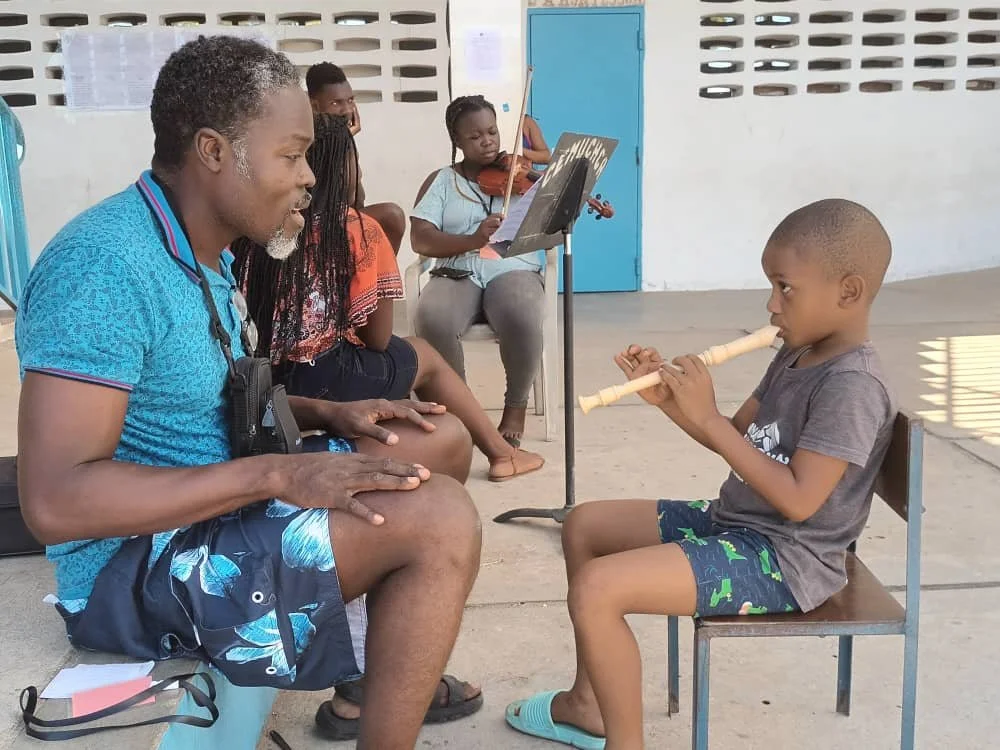Music in the Midst of Crisis
Haiti is in the grip of one of the most daunting humanitarian crises in its history. Over 1.3 million people have been displaced by gang violence. Entire communities have been emptied, and the road to the north—once a route to opportunity—has become so dangerous that travel is nearly impossible. And yet, against all odds, the music continues.
This summer, BLUME Haiti’s national music camp, hosted at the CEMUCHCA School in northern Haiti, brought together over 100 students and teachers from six of the country’s ten departments. Many of these young people have been uprooted by violence, their lives and dreams interrupted. And yet, for two weeks, they came together to learn, to grow, and to reclaim something every child deserves: a sense of safety, belonging, and joy.
We were able to offer full scholarships to all participants thanks to the generous support of many, including the D’Addario Foundation, which offered monetary as well as in-kind support, Esperance et Vie Episcopal School—which offered us their entire campus free of charge—and The Road to Hope, which underwrote scholarships and transportation for a number of displaced musicians from Mirebalais, a town overtaken by gangs earlier this year.
Many of these young musicians arrived at camp with heavy hearts. Some had fled their homes with only the clothes on their backs. Because of the increasing danger on the road, we had made the difficult decision to NOT invite musicians from Port-au-Prince. However, a few ventured the trip anyway. Thankfully, all made it safely but a number had terrifying stories of being stopped and searched by gangs. But the trauma they, and many others, carry is real and raw.
One young woman a refugee from the capital now living in Cap Haitian, told me on the first day of camp that she had lost all desire to play, to practice, or even to teach music—something that was once a large part of her identity. She is one of the over 1.3 million internally displaced people in Haiti. But by the end of camp, something had shifted. She found herself drawn back to her instrument, realizing that music could help her process her pain, not just escape it. A few days after camp ended, I saw her at a CEMUCHCA annex in Cap-Haïtien—smiling, engaged, and making plans for the future. Though traumatized, as are so many, she is beginning to heal.
This is the power of music, the power of community.
While the technical musical progress was remarkable, the deeper impact of camp was even more profound. According to our end-of-camp survey:
100% of participants said they had learned about teamwork, responsibility, and leadership.
97% reported feeling safe, welcomed, and part of a community.
81% made new friends; more than half reconnected with old ones they hadn’t seen in months.
And many told us they left with more calm, more confidence, and more hope.
For two weeks, these young people were able to just be kids again—free from the daily worry of food insecurity, displacement, and violence. There was laughter. There was focus. There was music.
At BLUME Haiti, we believe that music education is a tool for social change as we help successive generations of leaders unleash the creative, economic, and civic potential of their nation.. That belief guided every part of the CEMUCHCA camp. Daily discussions encouraged reflection on leadership, accountability, and cooperation. Campers came from all walks of life and lived, worked, and learned side-by-side. The sense of shared purpose and solidarity was palpable.
The situation in Haiti remains urgent. But the resilience of its young people - their courage, creativity, and joy - is undiminished.
Thank you for standing with us and with them.
P.S. Your support made this possible. If you’d like to help us continue offering music as a refuge and a path forward, please consider making a donation today: https://www.blumehaiti.org/donate









